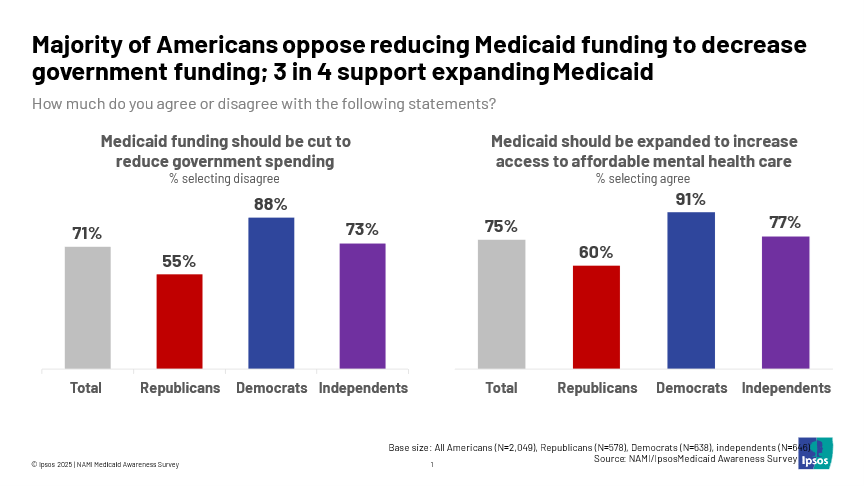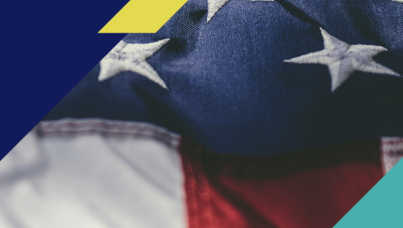Most Americans, across party lines, oppose Medicaid funding cuts
Washington, DC, April 3, 2025–A new NAMI/Ipsos poll finds that a majority of Americans oppose cuts to Medicaid funding and support protecting access to mental health care through Medicaid. The survey reveals bipartisan backing for Medicaid as an essential program, with 84% of Americans saying they agree it is crucial for providing health care to vulnerable populations. As Congress debates potential budget cuts to the program, seven in ten Americans disagree with reducing Medicaid funding to decrease government spending. The poll highlights concern about the state of mental health care in the U.S. and support for expanding access to mental health services through Medicaid.

Detailed Findings:
1. Americans view Medicaid as a vital program and oppose funding cuts. These views are shared by a majority across the political spectrum.
- Most Americans recognize Medicaid's role in providing health care to vulnerable populations, with 84% agreeing it is an essential program. This view is shared across party lines, with 93% of Democrats, 87% of Independents, and 77% of Republicans agreeing.
- Strong opposition to Medicaid cuts is evident, with 71% of respondents disagreeing that Medicaid funding should be cut to reduce government spending. This sentiment is particularly strong among Democrats (88%) and Independents (73%), while more than half of Republicans (55%) also oppose cuts.
- Nearly four in five (78%) Americans say Medicaid cuts would lead to worse health outcomes for low-income individuals and families. This concern is most pronounced among Democrats (92%) and Independents (82%) but also shared by 63% of Republicans.
2. There is majority support for protecting and expanding mental health care access through Medicaid.
- The importance of Medicaid in mental health care is widely recognized, with 78% of Americans saying they agree that it saves lives by helping people access mental health services.
- Expanding mental health care access garners majority support, with 75% saying Medicaid should be expanded to increase access to affordable mental health care. This rises to 82% for individuals with personal or family experience using Medicaid.
- Commitment to maintaining Medicaid's role in mental health care is further emphasized by 85% who say they support protecting federal Medicaid funding for mental health care access.
3. Americans are concerned about the state of mental health care broadly and want more action from policymakers.
- Three in four Americans (76%) say they are not content with the current state of mental health treatment in the United States.
- Many Americans (60%) believe that Congress is doing too little to address the current state of mental health care in the U.S., compared to 54% in June 2024.
- At the same time, 61% believe mental health care should be a high funding priority for the federal government. This rises to 76% for individuals with personal or family experience using Medicaid.
About the Study
This NAMI/Ipsos poll was conducted March 21 – 23, 2025, by Ipsos using the probability-based KnowledgePanel®. This poll is based on a nationally representative probability sample of 2,049 general population adults age 18 or older.
Where applicable, the topline is trended with six surveys, all for NAMI by Ipsos, details in the table below:
| Survey | Dates Conducted | Sample Size (N) | Population | Link |
| 1 | October 22-25, 2021 | 2,049 | Nationally representative probability sample of adults aged 18 or older | October 2021 |
| 2 | May 20-23, 2022 | 2,045 | May 2022 | |
| 3 | September 23-26, 2022 | 3,071 | September 2022 | |
| 4 | June 2-11, 2023 | 2,073 | June 2023 | |
| 5 | October 27-29, 2023 | 2,048 | October 2023 | |
| 6 | June 7-9, 2024 | 2,048 | June 2024 |
The margin of sampling error for this study is plus or minus 2.2 percentage points at the 95% confidence level, for results based on the entire sample of adults. The margin of sampling error takes into account the design effect, which was 1.06. The margin of sampling error is higher and varies for results based on other sub-samples. In our reporting of the findings, percentage points are rounded off to the nearest whole number. As a result, percentages in a given table column may total slightly higher or lower than 100%. In questions that permit multiple responses, columns may total substantially more than 100%, depending on the number of different responses offered by each respondent.
The survey was conducted using KnowledgePanel, the largest and most well-established online probability-based panel that is representative of the adult US population. Our recruitment process employs a scientifically developed addressed-based sampling methodology using the latest Delivery Sequence File of the USPS – a database with full coverage of all delivery points in the US. Households invited to join the panel are randomly selected from all available households in the U.S. Persons in the sampled households are invited to join and participate in the panel. Those selected who do not already have internet access are provided a tablet and internet connection at no cost to the panel member. Those who join the panel and who are selected to participate in a survey are sent a unique password-protected log-in used to complete surveys online. As a result of our recruitment and sampling methodologies, samples from KnowledgePanel cover all households regardless of their phone or internet status and findings can be reported with a margin of sampling error and projected to the general population.
The data for the total sample were weighted to adjust for gender by age, race/ethnicity, education, Census region, metropolitan status, and household income. The demographic benchmarks came from the 2024 March Supplement of the Current Population Survey (CPS).
- Gender (Male, Female) by Age (18–29, 30–44, 45-59 and 60+)
- Race/Hispanic Ethnicity (White Non-Hispanic, Black Non-Hispanic, Other, Non-Hispanic, Hispanic, 2+ Races, Non-Hispanic)
- Education (Less than High School, High School, Some College, Bachelor or higher)
- Census Region (Northeast, Midwest, South, West)
- Metropolitan status (Metro, non-Metro)
- Household Income (Under $25,000, $25,000-$49,999, $50,000-$74,999, $75,000-$99,999, $100,000-$149,999, $150,000+)
For more information on this news release, please contact:
Mallory Newall
Vice President, U.S.
Public Affairs
+1 202 374-2613
[email protected]
About Ipsos
Ipsos is one of the largest market research and polling companies globally, operating in 90 markets and employing over 18,000 people.
Our passionately curious research professionals, analysts and scientists have built unique multi-specialist capabilities that provide true understanding and powerful insights into the actions, opinions and motivations of citizens, consumers, patients, customers or employees. Our 75 solutions are based on primary data from our surveys, social media monitoring, and qualitative or observational techniques.
Our tagline "Game Changers" sums up our ambition to help our 5,000 customers move confidently through a rapidly changing world.
Founded in France in 1975, Ipsos has been listed on the Euronext Paris since July 1, 1999. The company is part of the SBF 120 and Mid-60 indices and is eligible for the Deferred Settlement Service (SRD).ISIN code FR0000073298, Reuters ISOS.PA, Bloomberg IPS:FP



